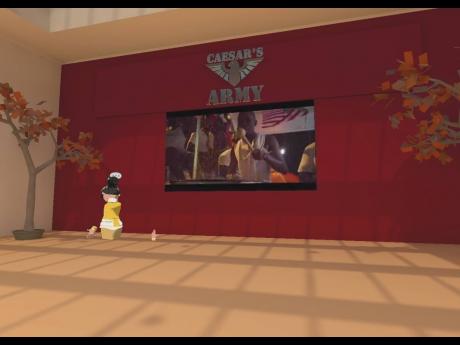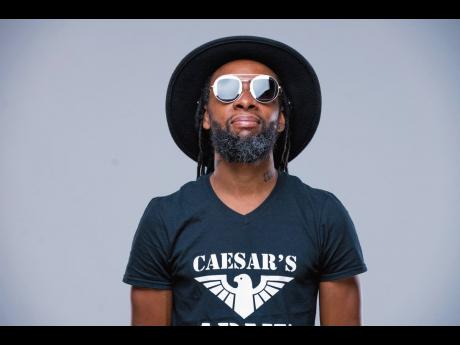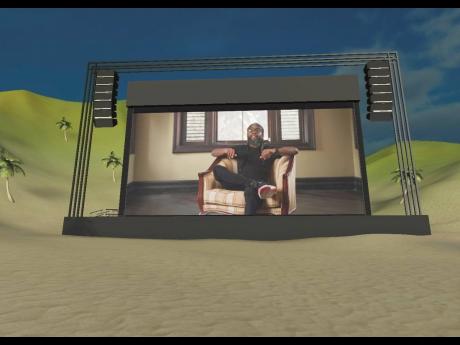Trinidad’s Caesar’s Army Antillea ‘is too real’ - Organisers say VR Technology is a way forward for carnival
As the popular adage goes, “Rome wasn’t built in a day,” and the Trinidad-based event production company Caesar’s Army has taken the time to lay the necessary building blocks as it creates and maintains an empire within the Caribbean carnival industry.
Now, as the popular season of fêtes is silenced, the company, through its Caesar Creativ is setting a new wave with its ‘too real’ virtual world branded as Antillea. The name signifies the Greater Antilles and Lesser Antilles coming together as one said the group’s commander-in-chief, Jules Sobion. “The discussions surrounding the idea started as early as April, during the period when Jamaica’s carnival would have been held. It started off with a virtual island, with more of a beach setting, but the objective was to create something that we could build and build similar to the world,” he said.
“We outlined a number of avenues we were interested in exploring, but our number-one priority was that we all agreed and believed there was a need to adapt and transform what we are good at, which is the power of experience, and not only for events, but for the corporate marketplace for brand activations, and so on.”
Antillea is currently marketed as a virtual space where users can attend live events globally and interact with each other through an avatar, which is created on the Microsoft Altspace VR platform. It employs virtual reality technology such as a headset or requires the 2D mode on a computer desktop or laptop. At present, it supports HTC Vive, Oculus Rift, Rift S, Go, and Quest as well as Windows Mixed Reality headsets.
“The premise of the virtual world was based on the three pillars of Caesar’s Army: to create an experience, to innovate, and to build a community, and for something to be experiential, it must be interactive. In our research, we also recognised there was no sort of Caribbeanness in the VR industry, meaning that the US and the UK would have been more accustomed and acclimatised to that form of technology,” Sobian pointed out.
Sobian, who is known widely by his moniker Julius Czar, has been involved in carnival for over a decade, first starting off as a promotional entity for Trinidad’s pan semi-final then organising events such as J’ouvert on carnival morning, which has evolved into a global events industry.
Last Friday, he and his team began the roll-out of the project, which is sponsored by Pizza Hut and Angostura, by opening it up to the world with its Antillea Soca Series. People may register for an invitation online and join the month-long carnival-related events, which will give the public a feel of the platform.
Trinidad’s carnival presentation was the first and last of 2020. The season in the Caribbean’s twin islands traditionally commences from Boxing Day (December 26) with Parang during the Christmas period when the new soca songs are unleashed.
NEW NORM
“With the whole element of a pandemic in the midst, the team sat down to access and strategise a way forward,” he told The Gleaner as he referred to Dream Entertainment Limited Managing Director Scott Dunn’s letter to the Jamaican Government about providing guidelines for events, adding that “we are the last to get protocols, and for us, who are deeply involved in carnivals throughout the year because it is in our blood, the pandemic has created a lot of hardships and even demise for those in the large ecosystem who did not embrace the new norm.”
“Caesar’s Army and Caesar Creativ decided to say, ‘Look! This is going to be the new norm’, and that is why we are trying to establish this hub, which will still serve a purpose when the industry picks back up. Our goal is [to] get persons immersed into it and promote it globally as the more persons will have access to the headsets, the more relevant it will be,” he continued.
Virtual reality technology has been on the market for a while now, sure, but nothing has solidified its value and relevance to numerous dimensions of everyday life such as the new norm he said, noting that “the headsets pre-COVID-19 were being sold at approximately US$800, but based on what the world is transforming into, the prices have dropped to as low as US$300, with an increase in the demand.”
The cost of the project is similar to the spend to execute events like A.M.Bush, but he said that the benefits of the investment are greater. The expectation is that Antillea will add to building a community with which the diaspora can identify and that the world can learn more about the culture while doing so.
“Events like A.M.Bush could cost us up to one million TT-dollars. The infrastructure for production and trucks is expensive to rent, but at least we know the application is ours after that money is spent. Of course, I miss the interaction and networking, but this helps us to rely on some form of normalcy, and when the platform opened up, I had strangers conversing with me through their avatars, wanting to speak on Caribbean culture and sharing their interests. Part of the arsenal is that live shows or fêtes can be streamed to the world. People can experience a virtual fête while at the same time be in the virtual space, which is way more experiential, in terms of interaction, than what we have been seeing with the virtual presentations of shows,” he said.



